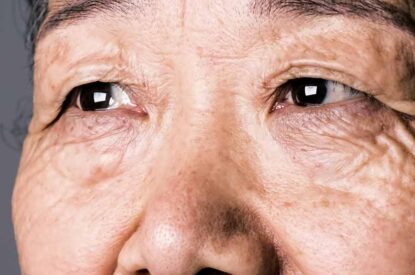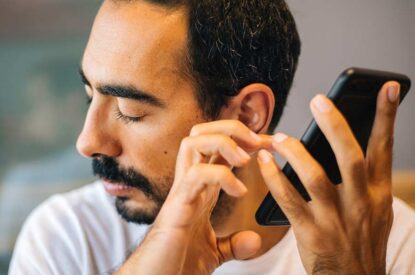Low-Vision Resources
Some people with glaucoma have “low vision.” Low vision means there may be problems doing daily, routine things even if using glasses or contact lenses.
The Glaucoma Research Foundation provides the following list of educational programs, support groups and counseling services as a resource for those with glaucoma and their families.
Educational Resources and Support Services
American Foundation for the Blind
2 Penn Plaza, Suite 1102
New York, NY 10121
(800) 232-5463
Email
Provides public education, social, and technological research for the blind or visually impaired. Also provides information on legislation affecting blind and visually impaired persons.
American Academy of Ophthalmology
P.O. Box 7424
San Francisco, CA 94120
(415) 561-8500
Sponsors EyeCare America, a project that provides a free initial eye exam to qualified patients. Also sponsors a program that provides eye exams to people over 65 who cannot afford care. Offers listing of national and local eye care organizations.
The American Optometric Association (AOA) Foundation
243 N. Lindberg Boulevard, Floor 1
St. Louis, MO 63141
Toll Free: (800) 365 -2219 ext. 4200
Direct: (314) 983-4200
Email
Canadian National Institute for the Blind
1929 Bayview Ave
Toronto, Ontario M4G 3E8
(416) 480-7580
Provides counseling, rehabilitation and educational materials to Canadians with low vision. Also offers large print books and books on tape.
Help for People with Visual Disabilities
Assisted Living Options for People with Disabilities
Assisted Living Options for People with Vision Impairment
Assisted Living Research Institute
P.O. Box 45829
Seattle, WA 98145-0826
(855) 221-9611
Dedicated to enhancing the quality of life of aging adults.
Higher Education for Students with Disabilities
AccreditedSchoolsOnline.org
P.O. Box 77041
San Francisco, CA 94107
Provides resources to foster school success through an online guide that explains the visual disability spectrum, the top tools available for each level of disability, and how schools can help.
Library of Congress
National Library Services for the Blind and Physically Handicapped
Washington, DC 20542
(202) 707-5100 or TDD (202) 707-0744
Email
Administers a free national library program of Braille and recorded books and magazines for the visually impaired and physically disabled. Blindness and Visual Impairments: Information and Advocacy Organizations (Item No. 896-01) is a free publication that lists state and nationwide advocacy, advisory and counseling programs.
Lighthouse Guild
250 West 64th Street
New York, NY 10023
(800) 284-4422 — TTY 711
Dedicated to addressing and preventing vision loss.
Lions Clubs International
300 22nd Street
Oak Brook, IL 60521-8842
(630) 571-5466
Supports SightFirst, a program that provides services for people with critical needs. Sponsors public awareness programs regarding diabetes and glaucoma. Supports eye banks, research and clinics.
National Eye Institute
31 Center Drive MSC 2510
Bethesda, MD 20892-2510
(301) 496-5248
The NEI, part of the National Institutes of Health, is the Federal government’s principal agency for conducting and supporting vision research. The NEI coordinates public and professional awareness activities related to low vision through the National Eye Health Education Program This program aims to increase awareness of low vision and its impact on quality of life and is directed toward people with low vision, their families and friends, and the health care and service professionals who care for them.
Prevent Blindness
211 W. Wacker Dr., Suite 1700
Chicago, IL 60606
(800) 331-2020
Offers information on diseases and injuries of the eye. Also available is a newsletter, Prevent Blindness News. Some Spanish materials are available.
Research to Prevent Blindness
645 Madison Avenue 21st Floor
New York, NY, 10022-1010
(800) 621-0026 or (212) 752-4333
Funds research to develop effective methods of treatment, prevention, and a cure for diseases that impair vision.
Tax Tips for the Blind
This web resource was recommended by one of our readers. Several aspects of federal tax law apply specifically to blind or visually impaired citizens. Anyone whose field of vision falls at or below 20 degrees, who wears corrective glasses but whose vision is 20/200 or less in his best eye, or who has no eyesight at all, meets the legal definition of being blind and is eligible for certain tax deductions.
Vision Forward Association
912 N. Hawley Road
Milwaukee, WI 53213
(414) 615-0103
Email
Educates professionals and the public about vision loss and related issues. Provides comprehensive rehabilitation services for all aspects of vision loss. Sells assistive technology products and devices.
Washington State Department of Services for the Blind
PO Box 40933
Olympia, WA 98504-0933
(800) 552-7103
Email
Provides information and job counseling, and teaches adaptive skills to people who are blind or have low vision.
Glaucoma Research Foundation makes no claim as to the accuracy of the information contained at the above linked websites, nor is inclusion on the list an endorsement of an organization. Updates on new or revised resources are appreciated and can be sent via our contact page.
Learn More


